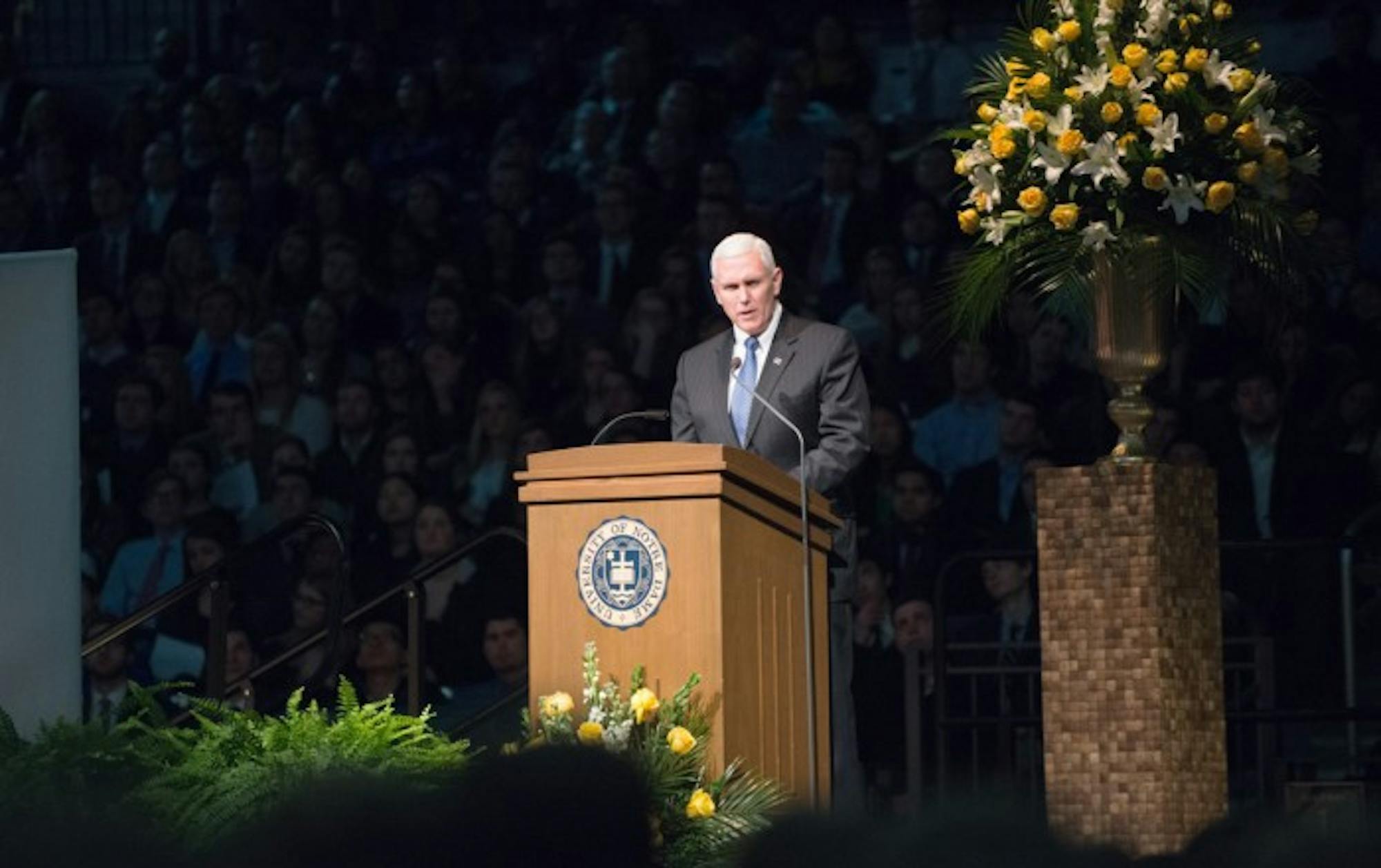
The University’s announcement of Vice President Mike Pence as the 2017 Commencement speaker Thursday incited a variety of reactions from the student body, particularly from members of the class of 2017.
The Senior Class Council released a statement to The Observer encouraging students to remain focused on the purpose of the Commencement ceremony.
“This weekend is ultimately a celebration of our accomplishments, and we are proud to be a part of this class,” the statement said. “We hope that in spite of the diverse political beliefs among our class, our graduation weekend will be an opportunity to spend quality time with our friends and family as we say goodbye to the place that we have grown to love.”
The executive board of Diversity Council, a student group promoting “awareness, understanding and acceptance of all differences that make up the Notre Dame community,” released a statement expressing the group’s dissatisfaction with the University’s decision.
“Our working definition of diversity spans, but is not limited to race, gender, ethnicity/culture, sexual orientation, socioeconomic status and spirituality,” it said. “In the spirit of our mission, we are disappointed and angered by the University’s announcement of Vice President Mike Pence as the 172nd Commencement speaker.”
The Diversity Council’s statement called into question University President Fr. John Jenkins’s statement announcing Pence as the speaker.
“In his statement, Fr. John Jenkins commended Vice President Pence for his ‘moral conviction’ and ‘dedication to the common good’ throughout his career as a public official,” the council’s statement said. “In response, we ask: Who is excluded from this vision of the common good? According to the vice president’s actions, many.”
The statement denounced the administration’s decision to invite Pence, citing his rhetoric regarding the Muslim community, his stances against Deferred Action for Childhood Arrivals (DACA) refugees and legislation he introduced and supported that allowed discrimination of the LGBT community.
“As the Diversity Council Executive Board, we wholeheartedly include these members of society, and of the Notre Dame family, in our vision of the common good,” it said. “In light of this invitation and endorsement of Vice President Pence as a representative of Notre Dame through the conferral of an honorary degree, we question whether the University’s administration can say the same.”
Other students, however, take a more positive view of Pence’s history in politics. The Notre Dame College Republicans — who met with Pence as a group last spring — released a statement in support of Pence as the commencement speaker shortly after the University’s announcement.
“The Notre Dame College Republicans are very proud to have Notre Dame host Vice President Mike Pence as this year’s commencement speaker,” the statement said. “Vice President Pence has a proven track record of conservative principles and has staunchly defended Christian values during his time in public office. We were honored to host him on campus during his time as governor of Indiana, and now we are excited for him to return as the vice president of the United States to deliver the keynote speech at this year’s commencement ceremony.”
Senior Pat Crane, president of the College Republicans, said in an email that although he is disappointed the administration has not upheld the “tradition of bringing the president to speak” at commencement, he looks forward to Pence serving as the commencement speaker instead.
“I am personally pleased to welcome Vice President Pence to campus as President Trump’s right hand man,” he said. “ … I am proud to hear his speech in May, which will continue the drive of the Trump administration to further unite this country and make America great again.”
The perceived tradition of inviting the president of the United States to speak at Notre Dame’s Commencement ceremony during his first year in office is a common misconception among members of the Notre Dame community. While six presidents have spoken at Notre Dame, only four have spoken at the Commencement ceremony during their first year in office: Jimmy Carter, Ronald Reagan, George W. Bush and Barack Obama.
The Notre Dame College Democrats also released a statement Thursday in response to the University’s announcement, which cites the intended purpose of the Commencement ceremony as a primary cause of the group’s stance against the decision.
“Commencement weekend is a time to honor our graduates and their families after four years of hard work and commitment,” the statement said. “As we send the class of 2017 into the world, we are given one last opportunity to celebrate their time and achievements here at the University of Notre Dame. We are profoundly disappointed that University President Fr. John Jenkins has chosen Vice President Mike Pence as Notre Dame’s 172nd Commencement speaker.”
The statement additionally challenged Jenkins’s assertion that Pence served with “quiet earnestness, moral conviction and a dedication to the common good characteristic of true statesmen” during his time as Indiana governor, pointing to Pence’s discrimination against the LGBT community in Indiana, as well as his stances on the Syrian refugee crisis and women’s rights as contradictions.
“The new Administration has shown a basic disregard for the fundamental rights of so many communities,” it said. “We are saddened that Fr. Jenkins would invite Vice President Pence to serve as an ambassador of that Administration, as he receives an honorary degree on a stage shared by members of the very communities he marginalizes.”
Notre Dame student groups react to University’s announcement of Mike Pence as Commencement speaker
Michael Yu | The Observer
Mike Pence speaks in Purcell Pavilion at a 2015 memorial service for Fr. Theodore Hesburgh, who served as the University's 15th president. Pence will address students at this year's May 21st commencement.









